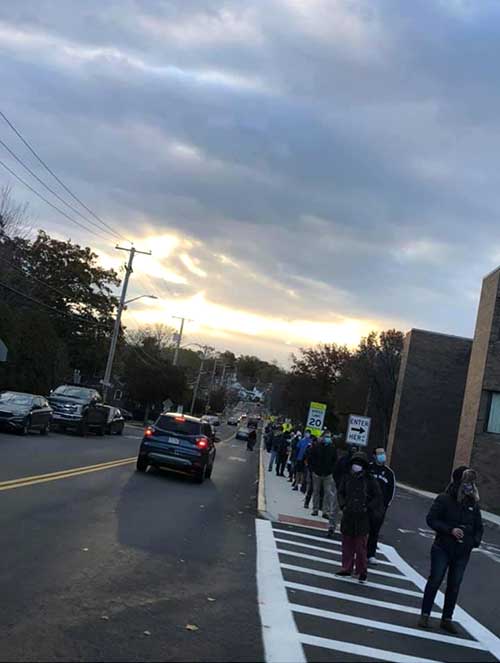Published November 6, 2020

MELROSE — Former Vice President Joe Biden and Democratic running mate Kamala Harris scored an impressive win in Melrose during this week’s quadrennial election, besting the Republican team of incumbent President Donald J. Trump and Mike Pence 12,847 votes to 4,508.
Of 21,082 registered voters in Melrose, 17,815 participated either Tuesday or during mail-in and early in-person voting.
All results are unofficial.
Incumbent Congresswoman Katherine Clark of Prospect Street won her race over Stoneham Republican Caroline Colarusso, 12,699 to 4,616. Across the 5th District, Clark received 252,762 votes to Colarusso’s 92,355.
US Senator Edward J. Markey also was a decisive victor in this election, besting Republican challenger Kevin J. O’Connor 12,657 to 4,693.
The Right to Repair question on the ballot passed easily in Melrose, 12,978 to 3,975.
“By voting yes on 1, Massachusetts has now updated Right to Repair for the modern age of connected cars,” said Right to Repair/Yes on 1 Director Tommy Hickey in a statement. “The thousands of ‘Yes on 1’ signs in front of small businesses around the state tell the story – automakers were trying to corner the market on car repairs, but the voters stopped them. The people have spoken, by a huge margin, in favor of immediately updating Right to Repair so it applies to today’s high-tech cars and trucks.”
The Coalition for Safe and Secure Data tapped into the more than $26.4 million raised to fight the ballot question to run numerous ads, including ominous spots suggesting that location data could be stolen, putting victims of domestic violence at risk.
“As we have said from the beginning, the right to repair and the ability of local repair shops to access vehicle repair information are already enshrined in Massachusetts law,” the Coalition for Safe and Secure Data said in a statement. “(Tuesday’s) vote will do nothing to enhance that right – it will only grant real time, two-way access to your vehicle and increase risk. At no point did the Yes side provide any credible arguments as to why national auto parts chains need this information to service your vehicles.”
Ranked choice voting, ballot Question 2, was rejected — but barely — by Melrosians 8,579 to 8,263.
The No on 2 campaign was thrilled that the ranked choice voting ballot question was defeated on Tuesday.
“Thank you to everyone who gave us donations, distributed and hosted lawn signs, liked and shared our Facebook page, held our signs at rallies, wrote letters to the newspapers and got the word out to friends and family,” a spokesperson wrote on the No on 2’s Facebook page. “Thank you to everyone who voted against this initiative. We are incredibly proud of the campaign that we ran. We were hugely outspent but we proved that people working together can achieve so much.”
Yes on 2 campaign manager Cara Brown McCormick expressed disappointment that Question 2 was defeated.
“We came up short in this election, and we are obviously deeply disappointed,” said Brown McCormick in a statement. “But that’s certainly no reflection of the hard work of the thousands of dedicated volunteers, staff and surrogates of this campaign. Even amidst a global pandemic, we were able to mobilize a movement to strengthen our democracy in a time when it’s needed most. We were attempting to do something historic in Massachusetts and fell short, but the incredible groundswell of support from volunteers and reformers that assembled behind this campaign is reason enough to stay optimistic about the future of our democracy.”
The city’s results mirror those across the state.
Biden won Massachusetts and Markey was reelected for another six-year term, for example.
Massachusetts residents faced a lot of choices: They voted to fill the open seat, approved a statewide ballot question expanding the state’s “right to repair” law, weighed a second ballot question on ranked choice voting and decided whether to reelect some longtime incumbents to Congress. A record number of voters cast ballots early or by mail, changing the complexion of Tuesday’s election.
Markey fended off a challenge from Republican Kevin O’Connor, a lawyer from Dover who’s pitched himself as a candidate who could help clean house in Washington. The 74-year-old Markey has served for decades in Congress, first in the House and later in the Senate.
Markey rebuffed a high-profile primary challenge from Democratic U.S. Rep. Joe Kennedy III in September.
In a live video address Tuesday night, Markey thanked his supporters and vowed to fight for action around climate change, racial justice and immigration reform. He credited the victory in large part to young activists who have organized around progressive ideals.
“Massachusetts voted to affirm our movement’s mandate for change, and I am grateful for that,” Markey said. “The age of incrementalism is over. The time to be timid is over. Now is our moment to think big, build big, be big.”
Biden’s win wasn’t a surprise in a state that has reliably backed Democratic presidential candidates. The only Republican presidential candidate in the recent era to carry the state has been Ronald Reagan in 1980 and 1984.
In the state’s 4th Congressional District, the Democratic Newton City Councilor Auchincloss became the newest member of the state’s all-Democratic congressional delegation by defeating Republican Julie Hall. The open seat was held by Kennedy, who opted not to seek reelection after deciding to challenge Markey.
The 32-year-old Marine Corps veteran narrowly edged out six fellow Democrats in September’s crowded primary.
Voters approved expanding the state’s “Right to Repair” law by giving car owners and independent auto shops greater access to data related to vehicle maintenance and repair.
Car repair shops and auto parts suppliers said the measure would guarantee car owners access to the repair information needed to bring their cars to auto shops. Automakers cast the question as a data grab by third parties who want to gather personal vehicle information.
Tommy Hickey, director of the Massachusetts Right to Repair Coalition, credited voters with updating the state’s right to repair law “for the modern age of connected cars.” while opponents said the new measure will “grant real time, two-way access” to cars.
Supporters of a second ballot question that would would make major changes to the way ballots are cast and tallied in future elections in Massachusetts by introducing ranked choice voting conceded defeat early Wednesday. The Associated Press has not called the referendum.
“We came up short in this election, and we are obviously deeply disappointed,” campaign manager Cara Brown McCormick said in a statement.
Under that system, voters would be given the option of ranking candidates in order of their preference — one for their top choice, two for their second choice, and so on.
If no candidate received a majority of the first-choice votes, the candidate with the fewest votes would be eliminated. Voters who ranked the eliminated candidate as their first choice would have their votes counted instead for their second choice. The process would repeat until one candidate receives a majority of the vote and wins.
Republican Gov. Charlie Baker is among the opponents of ranked choice voting, calling it complicated and costly. Supporters included Democratic U.S. Sen. Elizabeth Warren and Democratic Attorney General Maura Healey.
Four of the state’s remaining eight Democratic House incumbents defeated their Republican challengers.
Rep. Jim McGovern, who represents the state’s 2nd Congressional District, fended off GOP challenger Tracy Lovvorn, while 5th Congressional District Rep. Katherine Clark defeated a challenge from Republican Caroline Colarusso. Former presidential candidate Rep. Seth Moulton, who represents the 6th Congressional District, beat GOP challenger John Paul Moran, while Rep. William Keating, who represents the 9th Congressional District, fended off a challenge from Republican Helen Brady and independent Michael Manley.
Two Democratic incumbents — 1st Congressional District Rep. Richard Neal and 3rd Congressional District Rep. Lori Trahan — ran unopposed. 7th Congressional District Rep. Ayanna Pressley defeated independent Roy Owens to win a second term. 8th Congressional District Rep. Stephen Lynch defeated independent challenger Jonathan Lott.




